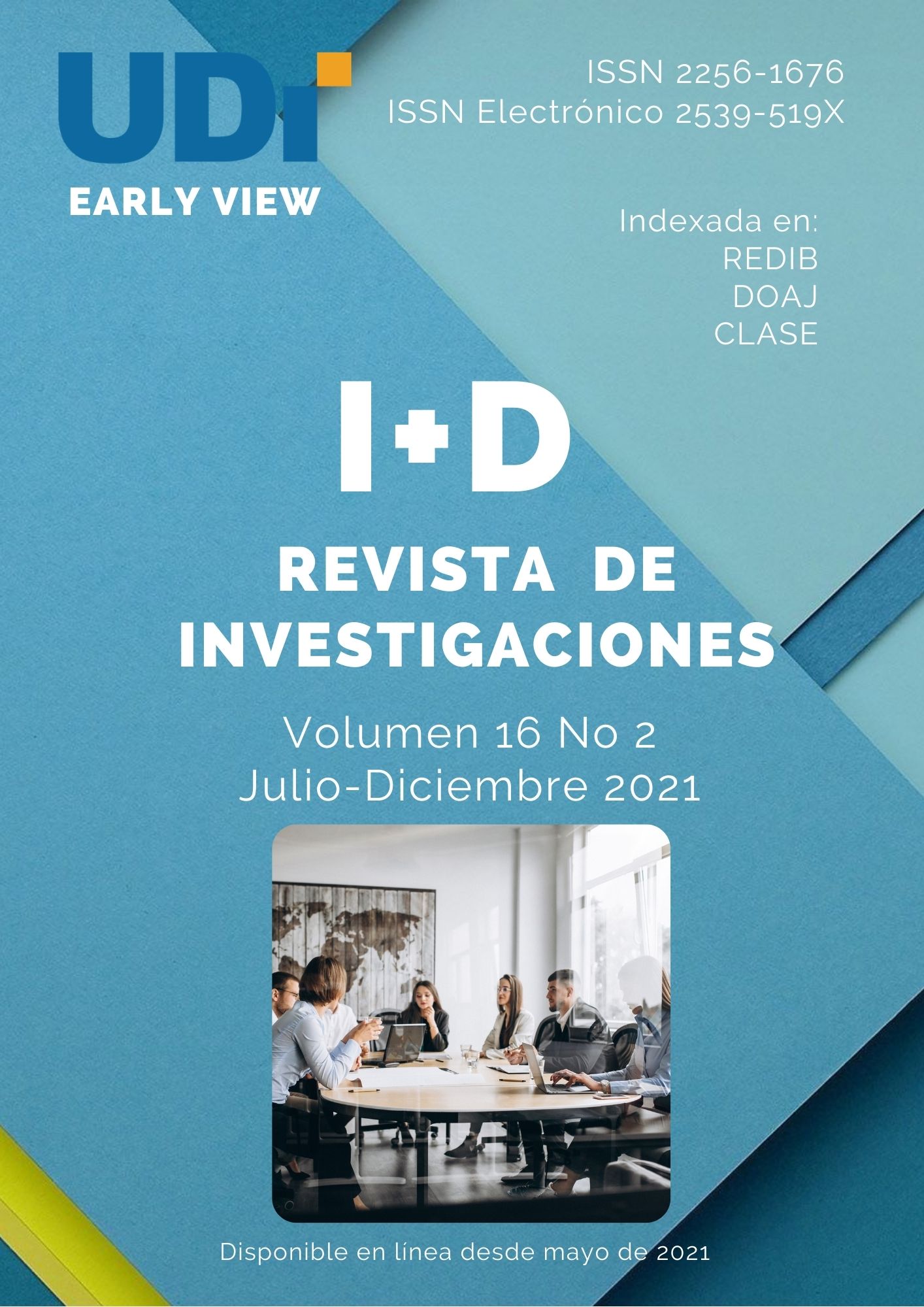Comportamientos ambientales en el sector turismo: revisión de tema
DOI:
https://doi.org/10.33304/revinv.v16n2-2021001Palabras clave:
Comportamientos, conservación ambiental, ecología, medio ambiente, turismoResumen
Se realizó una revisión sobre comportamientos ambientales en el sector turismo, con el fin de generar conocimiento que contribuya a mejorar el comportamiento ambiental del sector. Para esto se utilizó una ecuación de búsqueda, en español, en la base de datos Scielo, y en inglés, en la base de datos Scopus. Se incluyeron artículos publicados durante los últimos 5 años. El resultado final fueron 30 artículos que cumplían los criterios de inclusión para este estudio. El enfoque del artículo es novedoso porque aborda de forma integral, según la revisión bibliográfica, los diferentes modelos que buscan predecir el comportamiento ambiental, lo cual permite tener las bases teóricas para formular estrategias más completas enfocadas al cambio de comportamiento. Se concluye que es necesario utilizar un abordaje integral en las estrategias que buscan la promoción de comportamientos ambientales en el sector turismo.Descargas
Citas
Amérigo, M., García, J. A., & Côrtes, P. L. (2017). Analysis of environmental attitudes and behaviors: an exploratory study with a sample of brazilian university students. Ambiente & Sociedade, 20(3), 1–20. https://doi.org/10.1590/1809-4422asoc300r1v2032017
Arı, E., & Yılmaz, V. (2017). Effects of environmental illiteracy and environmental awareness among middle school students on environmental behavior. Environment, Development and Sustainability, 19(5), 1779–1793. https://doi.org/10.1007/s10668-016-9826-3
Ballantyne, R., Hughes, K., Lee, J., Packer, J., & Sneddon, J. (2018). Visitors’ values and environmental learning outcomes at wildlife attractions: Implications for interpretive practice. Tourism Management, 64, 190–201. https://doi.org/10.1016/j.tourman.2017.07.015
Cheung, L. T. O., Ma, A. T. H., Lee, K. M. Y., Lee, J. C. K., & Lo, Y. L. (2019). How does political orientation influence one’s environmental attitude and behaviour? Debate over country park conservation in Hong Kong. Environmental Science & Policy, 99, 115–122. https://doi.org/10.1016/j.envsci.2019.05.026
Clark, E., Mulgrew, K., Kannis-Dymand, L., Schaffer, V., & Hoberg, R. (2019). Theory of planned behaviour: predicting tourists’ pro-environmental intentions after a humpback whale encounter. Journal of Sustainable Tourism, 27(5), 649–667. https://doi.org/10.1080/09669582.2019.1603237
Congreso de la República. (1996). Ley 300 de 1996. https://www.funcionpublica.gov.co/eva/gestornormativo/norma.php?i=8634
Congreso de la República. (2008). Ley 1258 de 2008. http://www.secretariasenado.gov.co/senado/basedoc/ley_1258_2008.html
Côrtes, P. L., Guerner Dias, A., Da Silva Teixeira, M. E., & Vieira Pamplona, J. M. (2016). ENVIRONMENTAL BEHAVIOR: A COMPARATIVE STUDY BETWEEN BRAZILIAN AND PORTUGUESE STUDENTS. Ambiente & Sociedade, 19(3), 113–134. https://doi.org/10.1590/1809-4422ASOC139099V1932016
Cuervo-Arango, A. M., Garcia, J. A., & Sanchez Nuñez, T. (2013). Actitudes y comportamiento hacia el medio ambiente natural. Salud medioambiental y bienestar emocional. Universitas Psychologica, 12(3), 845–856. https://doi.org/10.11144/Javeriana.UPSY12-3.acma
D’Souza, C., Taghian, M., Marjoribanks, T., Sullivan-Mort, G., Manirujjaman, M. D., & Singaraju, S. (2019). Sustainability for ecotourism: work identity and role of community capacity building. Tourism Recreation Research, 44(4), 533–549. https://doi.org/10.1080/02508281.2019.1654727
Eilam, E., & Trop, T. (2012). Environmental attitudes and environmental behavior-which is the horse and which is the cart? Sustainability, 4(9), 2210–2246. https://doi.org/10.3390/su4092210
Fang, S.-C., & Yu, T.-Y. (2015). A Risk Perception Model Of Climate Change For University Students. Journal of Baltic Science Education, 14(3), 339–350.
Gao, Y. (2018). To Study the Relationship between Environmental Education and Environmental Behavior Based on Environmental Attitude. Ekoloji, 27(106), 627–634.
Getz, D. (1983). Capacity to absorb tourism: Concepts and implications for strategic planning. Annals of Tourism Research, 10(2), 239–263. https://doi.org/10.1016/0160-7383(83)90028-2
Gössling, S., Araña, J. E., & Aguiar-Quintana, J. T. (2019). Towel reuse in hotels: Importance of normative appeal designs. Tourism Management, 70, 273–283. https://doi.org/10.1016/j.tourman.2018.08.027
Grazzini, L., Rodrigo, P., Aiello, G., & Viglia, G. (2018). Loss or gain? The role of message framing in hotel guests’ recycling behaviour. Journal of Sustainable Tourism, 26(11), 1944–1966. https://doi.org/10.1080/09669582.2018.1526294
Han, H., & Hyun, S. (2018). College youth travelers’ eco-purchase behavior and recycling activity while traveling: an examination of gender difference. Journal of Travel & Tourism Marketing, 35(6), 740–754. https://doi.org/10.1080/10548408.2017.1405865
Han, W., McCabe, S., Wang, Y., & Chong, A. Y. L. (2018). Evaluating user-generated content in social media: an effective approach to encourage greater pro-environmental behavior in tourism? Journal of Sustainable Tourism, 26(4), 600–614. https://doi.org/10.1080/09669582.2017.1372442
Hanna, P., Wijesinghe, S., Paliatsos, I., Walker, C., Adams, M., & Kimbu, A. (2019). Active engagement with nature: outdoor adventure tourism, sustainability and wellbeing. Journal of Sustainable Tourism, 27(9), 1355–1373. https://doi.org/10.1080/09669582.2019.1621883
Hernandez Forero, Y. (2017). Caracterización del sector turismo empresarios de Bucaramanga y su área metropolitana [Universidad Santo Tomas]. https://repository.usta.edu.co/handle/11634/4775
Karpudewan, M., Ismail, Z., & Roth, W.-M. (2012). Promoting pro-environmental attitudes and reported behaviors of Malaysian pre-service teachers using green chemistry experiments. Environmental Education Research, 18(3), 375–389. https://doi.org/10.1080/13504622.2011.622841
Kovács, J., Pántya, J., Medvés, D., Hidegkuti, I., Heim, O., & Bursavich, J. B. (2014). Justifying environmentally significant behavior choices: An American-Hungarian cross-cultural comparison. Journal of Environmental Psychology, 37, 31–39. https://doi.org/10.1016/j.jenvp.2013.11.001
Landon, A. C., Woosnam, K. M., & Boley, B. B. (2018). Modeling the psychological antecedents to tourists’ pro-sustainable behaviors: an application of the value-belief-norm model. Journal of Sustainable Tourism, 26(6), 957–972. https://doi.org/10.1080/09669582.2017.1423320
Li, Q. C., & Wu, M. Y. (2019). Rationality or morality? A comparative study of pro-environmental intentions of local and nonlocal visitors in nature-based destinations. Journal of Destination Marketing and Management, 11(July 2018), 130–139. https://doi.org/10.1016/j.jdmm.2019.01.003
Lin, L. (2018). How would the contextual features of a destination function together with individual factors to enhance tourists’ intention toward ST in Taiwan? Journal of Sustainable Tourism, 26(9), 1625–1646. https://doi.org/10.1080/09669582.2018.1491586
Lin, Y. H., & Lee, T. H. (2020). How do recreation experiences affect visitors’ environmentally responsible behavior? Evidence from recreationists visiting ancient trails in Taiwan. Journal of Sustainable Tourism, 28(5), 705–726. https://doi.org/10.1080/09669582.2019.1701679
Liu, A., Ma, E., Qu, H., & Ryan, B. (2020). Daily green behavior as an antecedent and a moderator for visitors’ pro-environmental behaviors. Journal of Sustainable Tourism, 28(9), 1390–1408. https://doi.org/10.1080/09669582.2020.1741598
Luu, T. T. (2018). Employees’ green recovery performance: the roles of green HR practices and serving culture. Journal of Sustainable Tourism, 26(8), 1308–1324. https://doi.org/10.1080/09669582.2018.1443113
McCool, S. F., & Lime, D. W. (2001). Tourism Carrying Capacity: Tempting Fantasy or Useful Reality? Journal of Sustainable Tourism, 9(5), 372–388. https://doi.org/10.1080/09669580108667409
Md Noor, S., Rasoolimanesh, S. M., Jaafar, M., & Barghi, R. (2019). Inscription of a destination as a world heritage site and residents’ perceptions. Asia Pacific Journal of Tourism Research, 24(1), 14–30. https://doi.org/10.1080/10941665.2018.1541183
Mokhtari, D., Roostaei, S., Khodadadi, M., Ahmadi, M., Ebrahimi, O., & Shahabi, H. (2019). Evaluation of the Role of Environmental Education in Manesht and Ghelarang Geotourism Destination, Iran. Journal of Quality Assurance in Hospitality & Tourism, 20(6), 681–708. https://doi.org/10.1080/1528008X.2019.1616039
Okumus, F., Köseoglu, M. A., Chan, E., Hon, A., & Avci, U. (2019). How do hotel employees’ environmental attitudes and intentions to implement green practices relate to their ecological behavior? Journal of Hospitality and Tourism Management, 39, 193–200. https://doi.org/10.1016/j.jhtm.2019.04.008
Organización Mundial del Turísmo. (2008). Glosario de términos de turismo. UNWTO.Org. https://www.unwto.org/es/glosario-terminos-turisticos
Park, E., Lee, S. J., Lee, C. K., Kim, J. S., & Kim, N. J. (2018). An integrated model of travelers’ pro-environmental decision-making process: the role of the New Environmental Paradigm. Asia Pacific Journal of Tourism Research, 23(10), 935–948. https://doi.org/10.1080/10941665.2018.1513051
Peng, X., & Lee, S. (2019). Self-discipline or self-interest? The antecedents of hotel employees’ pro-environmental behaviours. Journal of Sustainable Tourism, 27(9), 1457–1476. https://doi.org/10.1080/09669582.2019.1632320
Qu, Y., Xu, F., & Lyu, X. (2019). Motivational place attachment dimensions and the pro-environmental behaviour intention of mass tourists: a moderated mediation model. Current Issues in Tourism, 22(2), 197–217. https://doi.org/10.1080/13683500.2017.1399988
Rivera-Torres, P., & Garcés-Ayerbe, C. (2018). Desarrollo del comportamiento proambiental en los individuos y sus determinantes / Development of Pro-Environmental Conduct in Individuals and its Determinants. Revista Española de Investigaciones Sociológicas, 163, 59–78. https://doi.org/10.5477/cis/reis.163.59
Safshekan, S., Ozturen, A., & Ghaedi, A. (2020). Residents’ environmentally responsible behavior: an insight into sustainable destination development. Asia Pacific Journal of Tourism Research, 25(4), 409–423. https://doi.org/10.1080/10941665.2020.1737159
Tussyadiah, I., & Miller, G. (2019). Nudged by a robot: Responses to agency and feedback. Annals of Tourism Research, 78. https://doi.org/10.1016/j.annals.2019.102752
Vanegas Rico, M. C., Corral-Verdugo, V., Ortega-Andeane, P., & Bustos Aguayo, J. M. (2018). Desarrollo de la Escala Expectativa de Comportamiento Ambiental de Otros con adultos jóvenes mexicanos. Universitas Psychologica, 17(2), 1–10.
Vollero, A., Conte, F., Bottoni, G., & Siano, A. (2018). The influence of community factors on the engagement of residents in place promotion: Empirical evidence from an Italian heritage site. International Journal of Tourism Research, 20(1), 88–99. https://doi.org/10.1002/jtr.2164
Wang, C., Zhang, J., Sun, J., Chen, M., & Yang, J. (2020). Public environmental facilities: Hygiene factors for tourists’ environmental behaviour. Environmental Science and Policy, 106, 40–47. https://doi.org/10.1016/j.envsci.2020.01.009
Wang, S., Wang, J., Li, J., & Yang, F. (2020). Do motivations contribute to local residents’ engagement in pro-environmental behaviors? Resident-destination relationship and pro-environmental climate perspective. Journal of Sustainable Tourism, 28(6), 834–852. https://doi.org/10.1080/09669582.2019.1707215
Wang, S., Wang, J., Li, J., & Zhou, K. (2020). How and when does religiosity contribute to tourists’ intention to behave pro-environmentally in hotels? Journal of Sustainable Tourism, 28(8), 1120–1137. https://doi.org/10.1080/09669582.2020.1724122
Wicker, P. (2018). The carbon footprint of active sport tourists: an empirical analysis of skiers and boarders. Journal of Sport & Tourism, 22(2), 151–171. https://doi.org/10.1080/14775085.2017.1313706
Wu, X., & Lu, W. (2013). A Study on Environmental Attitude, Environmental Behavior and Environment Issues of Living Place: The Questionnaire Survey for some Dwellers in Shenzhen. Applied Mechanics and Materials, 368–370, 290–296. https://doi.org/10.4028/www.scientific.net/AMM.368-370.290
Zhang, H., Zhang, Y., Song, Z., & Lew, A. A. (2019). Assessment bias of environmental quality (AEQ), consideration of future consequences (CFC), and environmentally responsible behavior (ERB) in tourism. Journal of Sustainable Tourism, 27(5), 609–628. https://doi.org/10.1080/09669582.2019.1597102
Zhang, J., & Huang, R. (2019). Employees’ pro-environmental behaviours (PEBs) at international hotel chains (IHCs) in China: The mediating role of environmental concerns (ECs). Journal of Hospitality and Tourism Management, 39, 129–136. https://doi.org/10.1016/j.jhtm.2019.03.007
Zhang, Yachen, Moyle, B. D., & Jin, X. (2018). Fostering visitors’ pro-environmental behaviour in an urban park. Asia Pacific Journal of Tourism Research, 23(7), 691–702. https://doi.org/10.1080/10941665.2018.1487457
Zhang, Yuling, Xiao, X., Zheng, C., Xue, L., Guo, Y., & Wu, Q. (2020). Is tourism participation in protected areas the best livelihood strategy from the perspective of community development and environmental protection? Journal of Sustainable Tourism, 28(4), 587–605. https://doi.org/10.1080/09669582.2019.1691566
Zheng, W.-L., Wang, J.-W., & Zhang, X. (2018). Effects of Environmental Cognition and Environmental Attitude on Environmental Behavior of Ecotourism. Ekoloji, 27(106), 1743–1749.












